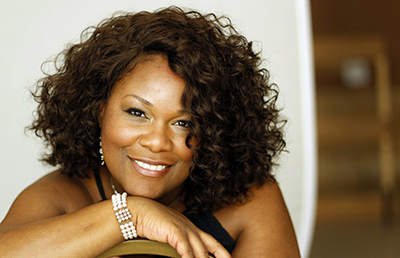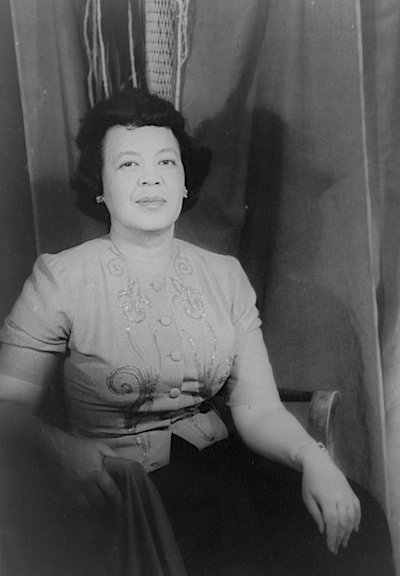by Jarrett Hoffman

•Today: The Cleveland Orchestra features soprano Latonia Moore (pictured), and the Silver Hall series presents the Case Camerata Chamber Orchestra
•In the Industry: postcard campaigns for arts funding in Cleveland, a recent conversation at the Bop Stop, and a date for the Ohio Arts Professionals Network
•Educational opportunities from The Music Settlement, Piano Cleveland, and Tri-C
•Articles about cultural exchange and politics during wartime
•Our almanac, featuring Margaret Bonds and her partnerships with Florence Price and Langston Hughes
HAPPENING TODAY:
At 7:30 pm, The Cleveland Orchestra features soprano Latonya Moore as soloist in George Walker’s Lilacs as part of a program that also includes works by Joseph Haydn and Richard Strauss. And at that same hour, the Silver Hall Concert Series presents the Case Camerata Chamber Orchestra at the Maltz Performing Arts Center.
Details in our Concert Listings.
IN THE INDUSTRY:
Cuyahoga Arts & Culture and Assembly for the Arts have partnered to start postcard campaigns around the region “to ensure Cleveland artists get their fair share of the recent $511 million American Rescue Plan Act (ARPA) allotted to Cleveland,” Karin Connelly Rice writes in FreshWater.
On Tuesday, the Bop Stop played host to a Cleveland Music Industry Conversations event in which organizations such as Cleveland Rocks, ListenCLE, Assembly for the Arts, Rock & Roll Hall of Fame, and Destination Cleveland shared upcoming programs and opportunities for industry professionals. The event was live-streamed and is still available to watch here.
This year’s Ohio Arts Professionals Network conference will be held September 12-14 in Toledo. Presenters, agents, artists, and arts professionals are welcome to attend. More info here.
EDUCATIONAL OPPORTUNITIES:
The Music Settlement is enrolling for spring sessions of its Arts for the Young classes, aimed at kids ages three weeks to six years, with both in-person and virtual options. Moving up an age group or two, the organization is collaborating with Piano Cleveland in offering a piano course for teens, which begins March 10.
And Tri-C is hosting a free virtual master class on Sunday, March 6 led by bassist Matt Brewer, drummer Kendrick Scott, and pianist Aaron Parks of the Jazz Gallery All-Stars prior to the ensemble’s performance that evening at 7:30 pm.
MUSIC IN WARTIME:
Given the engagements and positions recently lost by musicians with ties to Vladimir Putin since the start of the war in Ukraine, Zachary Woolfe digs into questions around cultural exchange and politics in an article for The New York Times, comparing the situations and responses of artists past and present.
And in an article for NPR, Anastasia Tsioulcas points out the Russian performing artists who have spoken out against Putin, including conductors Semyon Bychkov and Kirill Petrenko.
TODAY’S ALMANAC:

That historic concert under the baton of then-music director Frederick Stock also included Florence Price’s Symphony in e, the first composition by a Black woman to be performed by a major orchestra. That programming came about after Price won first prize in the 1932 Wanamaker Foundation Awards for her symphony, while Bonds took first in the song category for Sea Ghost.
Bonds and Price, 26 years the elder, shared friendship and support throughout their lives. That began with Price teaching piano and composition to Bonds when the latter was in high school. From there, as pianist and musicologist Samantha Ege told Laura Emerick for the Chicago Symphony’s Sounds & Stories,
When Price faced financial straits, Bonds’ mother, Estella, welcomed her into their home. When Price had deadlines to meet for music contests, the Bonds were there, helping her to meet those deadlines. And with Margaret Bonds being a chief interpreter of Price’s piano works, these works became a vehicle for Bonds’ talent. Their friendship was truly about uplifting one another.
But perhaps the most famous partnership in Bonds’ career was with Langston Hughes. She discovered his poetry in 1929 while studying piano and composition at Northwestern University, where she was one of the few Black students, and was not allowed to live on campus. She described that discovery to James Hatch in an interview in 1971:
I was in this prejudiced university, this terribly prejudiced place…. I was looking in the basement of the Evanston Public Library where they had the poetry. I came in contact with this wonderful poem, “The Negro Speaks of Rivers,” and I’m sure it helped my feelings of security. Because in that poem he tells how great the black man is. And if I had any misgivings, which I would have to have — here you are in a setup where the restaurants won’t serve you and you’re going to college, you’re sacrificing, trying to get through school — and I know that poem helped save me.
Bonds eventually met Hughes in person in 1936 at the home of an artist who was a mutual friend. An exhibition from the Georgetown University Library describes how their relationship progressed:
Shortly thereafter, Hughes attended one of the Sunday afternoon musicales hosted by Bonds’s mother, Estella. “My family rolled out the red carpet,” claimed Bonds. And from that day forward, “we were like brother and sister, like blood relatives.”
Bonds went on to set many texts by Hughes. As opera singer and scholar Louise Toppin told NPR on the centennial of Bonds’ birth, Bonds “loved the way he told the story of African-Americans and Harlem during this time…” Among the highlights of those settings, she wrote music for his play Shakespeare in Harlem, used his words in her cantata Ballad of the Brown King, and composed the song cycle Three Dream Portraits.
The cantata received its world-premiere recording in 2019, which you can hear in a playlist on YouTube as performed by The Dessoff Choirs & Orchestra under conductor Malcolm J. Merriweather. And the song cycle was recently recorded by baritone Will Liverman and pianist Paul Sánchez on the album Dreams of a New Day: Songs by Black Composers — listen to movements one, two, and three on YouTube, and purchase or stream the album here.
Whether through those close relationships with Price and Hughes, or through community leadership, a central part of Bonds’ legacy is supporting other Black artists. In 1956, she organized the Margaret Bonds Chamber Music Society (a group of Black musicians dedicated in large part to performing music by Black composers), and in the ‘60s helped establish the Harlem Cultural Community Center, among other projects.
Finally, Bonds is also known for her popular arrangements of spirituals, such as He’s Got The Whole World In His Hands — created for soprano Leontyne Price in 1963. Hear Price sing it here.



